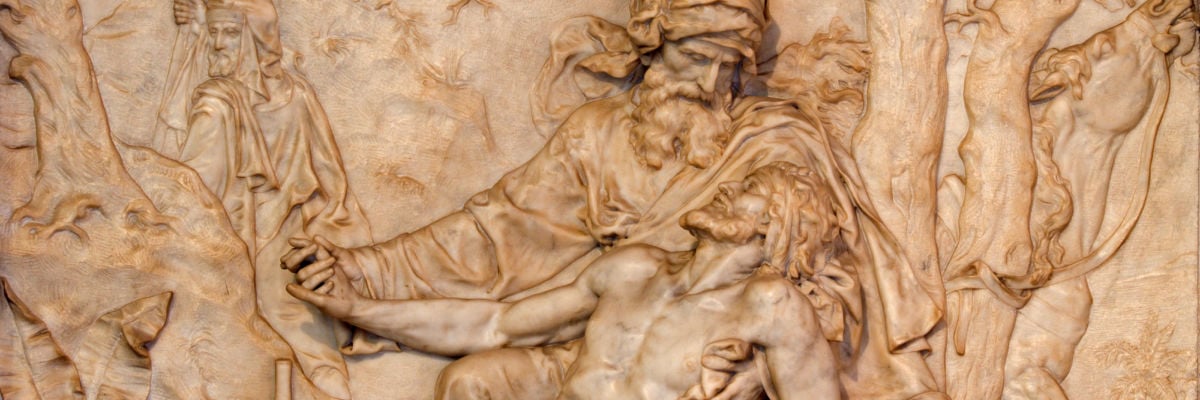
The famous parable of the Good Samaritan is found only in the Gospel according to St. Luke. It speaks especially of works of mercy, a theme dear to the heart of Luke and his companion St. Paul, who was especially mindful of the poor (see Gal. 2:10).
The Context of the Parable of the Good Samaritan
Jesus told this parable in response to a question by a teacher of the law who was testing him about the conditions for possessing eternal life. The lawyer correctly identifies the great commandments of love of God and love of neighbor, but then, in an attempt to justify himself, he asks for a clarification about who is his neighbor.
It is remarkable that Jesus answers his question so beautifully and profoundly, even though his motivations are not upright. Jesus is the sower who sows the good seed even on bad soil. The lawyer wants to appear knowledgeable and deserving of the title “teacher.” But Jesus emphasizes the fact that it is not knowledge of the commandments, but doing the commandments that results in eternal life. Mercy is not just about words; it is even more about deeds.
The Literal Sense of the Parable
The literal sense of this parable instructs us that our neighbors are not restricted to those who hold the same beliefs as we do. Certainly the priest and the Levite were authorities and knowledgeable about the law of God, yet that knowledge did not make them a neighbor to the fallen man.
On the other hand, the Samaritan, who held not only different beliefs, but false beliefs, was moved with compassion, and through this compassion was moved to action. This underscores the spiritual universality of the new priesthood (whether the ministerial priesthood or the priesthood of all the baptized), which is truly universal, truly catholic, not bound to one people, nor giving preference to carnal relations. Deeds of love and mercy are not restricted to those who are always correct, and it is compassion and the deeds that flow from it that determine who our neighbor is. Our neighbor is anyone who does deeds of mercy or anyone to whom we can show mercy.
The Spiritual Sense of the Parable
It is worthwhile to pause and reflect more profoundly on the spiritual sense of this parable, since it is a summary of the entire history of salvation.
A certain priest, representing the priesthood of the Old Covenant, came down that way by chance—that is, with remedies that bore no intrinsic power in themselves to heal man’s fallen state. For the sacrifices of the Old Law were mere signs of future realities and bore no intrinsic relation to the wound that needed to be healed. Thus it is said to happen by chance, since those things that are not related essentially to a thing happen to it by chance. And he passed by on the other side, for the sacrifices of the Old Law were ineffectual of themselves for taking away sin, “for it was impossible that the blood of bulls and goats should take away sin” (Heb. 10:4). And therefore these sacrifices and the priesthood associated with them passed by as being established for a time only before the coming of Christ.
Likewise a Levite—that is, one knowledgeable in the law—came and looked upon him, and passed by on the other side—that is, the law made known to man his sin (so that it is said to look upon him) but could not provide a remedy for it (so that it is said to pass him by). “For no man will be justified in his sight by works of the law; since through the law comes knowledge of sin” (Rom. 3:20). Thus also, the old law was in effect for a time, until it was fulfilled in Christ. And so both the former priesthood and law were unable to assist man in his condition of original sin, since for this grace was necessary. Only the new priesthood and the New Law are able to heal the wound of original sin.
And a certain Samaritan—that is, Christ—came down to him. Jesus was called a Samaritan for good reason: for he came from a foreign country above Judah (namely, his heavenly homeland). Thus, when the Lord was accused by the Jews of having a devil and being a Samaritan, he refuted them with regard to the first accusation but not the second (John 8:48 and following) to signify that he was indeed from a foreign land. He testified this to Pontius Pilate when he said, “My kingdom is not of this world” (John 18:36). And Jesus is said to have come down to man since he assumed our lowly human nature when “the Word was made flesh and dwelt among us” (John 1:14).
And Jesus, having seen, was moved with pity. That is, having seen for the first time by experiential knowledge the condition of suffering humanity, he was moved in his Sacred Heart with pity for us. And having come to him, he bound up his wounds. For Jesus came down to us by the Incarnation, but he came near to us by accepting the defects of sinful flesh and by enduring suffering for our sakes, and in this way he bound up our wounds: “By his stripes we were healed” (Isa. 53:5).
Being Evangelized by the Parable of the Good Samaritan
Each of us has been wounded by the wound of original sin. We have added to this wound by our own personal sins. But Jesus has drawn near to us in his compassion and bathed and bound up these wounds by baptism. He has entrusted us to his Church until he comes again. Therefore, it is in and with the Church that we will find healing and strength. By trusting the Church, we entrust ourselves to Jesus. Let us grow strong and be nourished by the bread of true doctrine and the healing balm of the sacrament of penance given to the whole Church through his innkeeper, the successor of St. Peter.
Evangelizing with the Parable of the Good Samaritan
The Samaritans were not just strangers; they were also considered heretics and enemies of the Jewish people. When they would not welcome Jesus as he was on his way to Jerusalem, John wanted to call down fire from heaven to destroy them, just as the prophet Elijah had done some centuries earlier (Luke 9:54, 2 Kings 1:10-14). But it was only a short time after Jesus’ ascension when John was sent to call down not destroying fire, but the saving fire of the Holy Spirit, because the Samaritans had received the word of God with such fervor (Acts 8:14-17).
In the same way, we must look upon the enemies of the Church as objects of salvation and divine mercy. Indeed, many of them may become the most fervent converts to the Faith. After all, St. Paul was a converted Pharisee. Evangelization excludes no one.
For more like this from Fr. Walshe, try Secrets from Heaven, available at the Catholic Answers Shop.



